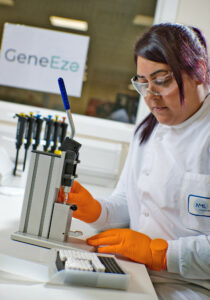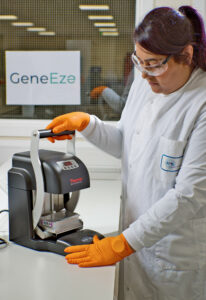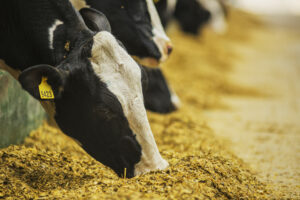State of the art lab to help farmers unlock the genetic potential of their herd
19th May 2021
The new custom-built genomic testing laboratory was opened by the NMR in April 2021, and it has now completed the first 1,000 tests on tissue samples from UK dairy cattle.
The National Milk Records (NMR) has invested an initial £400,000 in the state-of-the-art genotyping facility, which includes robotic sampling equipment. The lab has already begun testing of genetic tissue and other materials such as milk. The capacity of this laboratory can be increased as this new technology becomes more mainstream in the dairy industry. Testing in this fashion can give farmers valuable data on their herd’s health, production, fertility and more.
NMR’s GeneEze laboratory currently offers genomic tests for purebred commercial and pedigree herds, of all AHDB compliant breeds, which are recorded through NMR. A pilot project on behalf of a major milk retailer is also being carried out in the laboratory.

GeneEze team leader Ashu Bassan preparing tissue sampling units for DNA extraction
© RICHARD STANTON 2021.
“Genomic testing is a four-day laboratory process,” says Ashu Bassan, who heads up the operation for NMR. A forensic scientist by training and with food quality testing experience, she and her team of technicians manage the process of DNA extraction and testing.
Tissue samples from UK dairy cattle arrive at the laboratory, clearly identified with a QR barcode. The genetic information is extracted in the step-by-step laboratory procedure and leads to an iScan report, produced from bead chip readings for 55,000 DNA markers per sample. The report, and a summary, are sent to AHDB for evaluation. They are then turned into practical and easy to understand data to support farmers and advisers. The continually evolving sector of genomic testing can enable farmers to make more accurate and informed breeding decisions.
“The new lab offers a convenient and cost-effective genomic testing service for those who want to use the technology to improve the genetic progress in their herds,” says NMR’s genomic manager Richard Miller. “And users of the GeneEze genomic service can also use our ID genotype tags for taking tissue samples, to make the process easy and simple.
“In fact, the name ‘GeneEze’ is designed to reflect the simplicity of the genomic testing service, from order to result. The genomic test results can be automatically integrated with the cow’s NMR recording information via Herd Companion, so farmers and their advisers can see all the information on one place and through one system.”
The easy to order and use system should make accessing the very latest technology a less daunting prospect for farmers. Genomic tests are proven as a more accurate prediction of an animal’s genetic potential, compared to using parent and ancestral records, which is particularly valuable in younger animals. “It allows farmers to identify, rear and breed from heifers and cows in their herd in a way that will best meet their goals,” adds Mr Miller.
Costs depend on the number of tests needed for the herd. But even for the smallest volumes, the basic genomic test via GeneEze will be under £25.
Alongside the GeneEze test, NMR also markets CLARIFIDE and CLARIFIDE Plus on behalf of Zoetis, which offers additional health and wellness data. This means that NMR can offer its customers across the UK a simple route into genomics testing alongside a wider range of genomic testing and support services.
A simplified account of genomic testing

Day 2 Heat sealing midi plate for overnight incubation © RICHARD STANTON 2021.
Once the tissue samples, which are taken on farm and placed in clearly bar-coded vials, arrive at the laboratory they start a four-day process.
- Day 1 – DNA is extracted from tissue samples and plated out into a PCR plate
- Day 2 – DNA is amplified then pipetted into deeper wells on a plate so reagents can be added. Genomic DNA is incubated for between 20 and 24 hours
- Day 3 – DNA is fragmented, centrifuged and incubated several times before the hybridised DNA is put onto bead chips
Bead chips containing the DNA samples are then placed into a hybridisation chamber and incubated for between 16 and 24 hours.
- Day 4 – After washing, staining and drying, the bead chips are read on an iScan
Two reports are produced – one with 55,000 DNA markers and a summary report.

